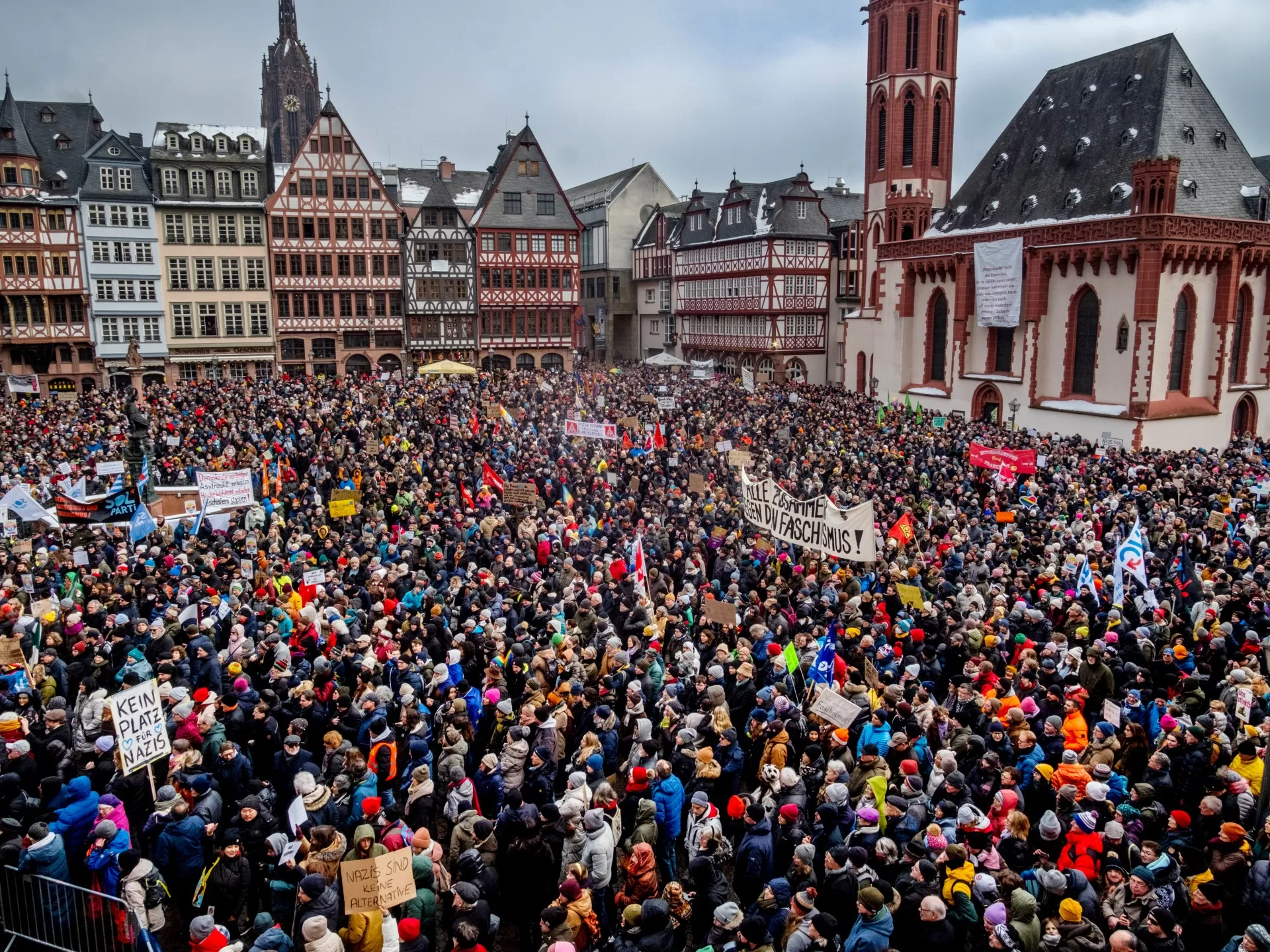‘Nazis, no thank you’ and ‘It feels like 1933, AfD ban now!’ read some of the banners at protests across the country.
“Nazis, no thank you”, “It feels like 1933, AfD ban now!” and “Investigate banning AfD” read some of the banners among other slogans at protests across the country against the AfD party’s anti-immigrant stance that has rekindled Nazi-era Germany of 1930s and 40s.
Thousands of people are expected to join new protests on Sunday, as German Chancellor Olaf Scholz called the protests against the far-right party “good and right”.
The European nation last week also faced protests from farmers, who have expressed their deep frustration with the centre-left-led government’s failure to check inflation and a decision to scrap diesel tax breaks. The two protests are not connected.
So who are Germany’s far-right AfD and why their anti-immigrant stance has triggered countrywide mass protests?
Why is the AfD slammed in the protests?
The mass protests were triggered after an investigative media organisation, Correctiv, released a report about the “undisclosed” meeting near Berlin, where a proposal to deport millions of immigrants and refugees, including some with German citizenship, was discussed.
Among the participants at the talks was Martin Sellner, a leader of Austria’s Identitarian Movement, which subscribes to the “great replacement” conspiracy theory that claims there is a plot by non-white migrants to replace Europe’s “native” white population.
The anti-immigration party confirmed the presence of its members at the meeting but has denied taking on the “remigration” project championed by Sellner.
News of the gathering sent shockwaves across Germany at a time when the AfD is soaring in opinion polls, just months ahead of three major regional elections in eastern Germany where their support is strongest.
Interior Minister Nancy Faeser went so far as to say in the newspapers of the Funke press group that the far-right meeting was reminiscent of “the horrible Wannsee conference”, where the Nazis planned the extermination of European Jews in 1942.
What explains the rise of the AfD?
The AfD was founded as a Eurosceptic party in 2013 and first entered the German Bundestag in 2017.
Most polls now put it in second place nationally with about 20 percent support, far above the 10.3 percent it won during the last federal election in 2021.
The party is especially strong in eastern Germany, where state elections are slated to take place later this year in Thuringia, Saxony and Brandenburg. The AfD is leading the polls in all three states with more than 30 percent support.
Since its founding, the party has continually moved to the right and gained support for its fierce anti-refugee and anti-immigration views.
The increase in immigration amid the crises in the Middle East and the war on Ukraine, as well as the frustration over the government’s economic policies, are seen as the main reasons for the rise of AfD.
How large were the protests?
Some 250,000 demonstrators gathered in cities across the country on Saturday, according to estimates by public broadcaster ARD, with protesters carrying signs such as “Nazis out”.
A demonstration on Friday in Hamburg, Germany’s second-largest city, drew what police said was a crowd of 50,000 and had to be ended early because the mass of people led to safety concerns. Police said a Saturday afternoon protest in Frankfurt drew 35,000 people.
Demonstrations in Stuttgart, Nuremberg and Hannover, among other cities, also drew large crowds, according to the German media.
Additional protests planned for Sunday in other major German cities, including Berlin, Munich and Cologne, are also expected to draw tens of thousands of people.
What did Scholz say about the protests?
German Chancellor Scholz has welcomed the rise of anti-far-right protests.
Last week, his government pushed through legislation that will ease the rules on gaining citizenship and end a ban on holding dual citizenship. Far-right groups have been critical of Germany’s acceptance of refugees.
“I try to imagine how the more than 20 million citizens who have a history of migration feel” about the reported plans, said Scholz, calling far-right hardliners an attack on democracy.
“With the new citizenship law, we are saying to all those who have often lived and worked in Germany for decades, who abide by our laws, who are at home here: You belong to Germany.”
